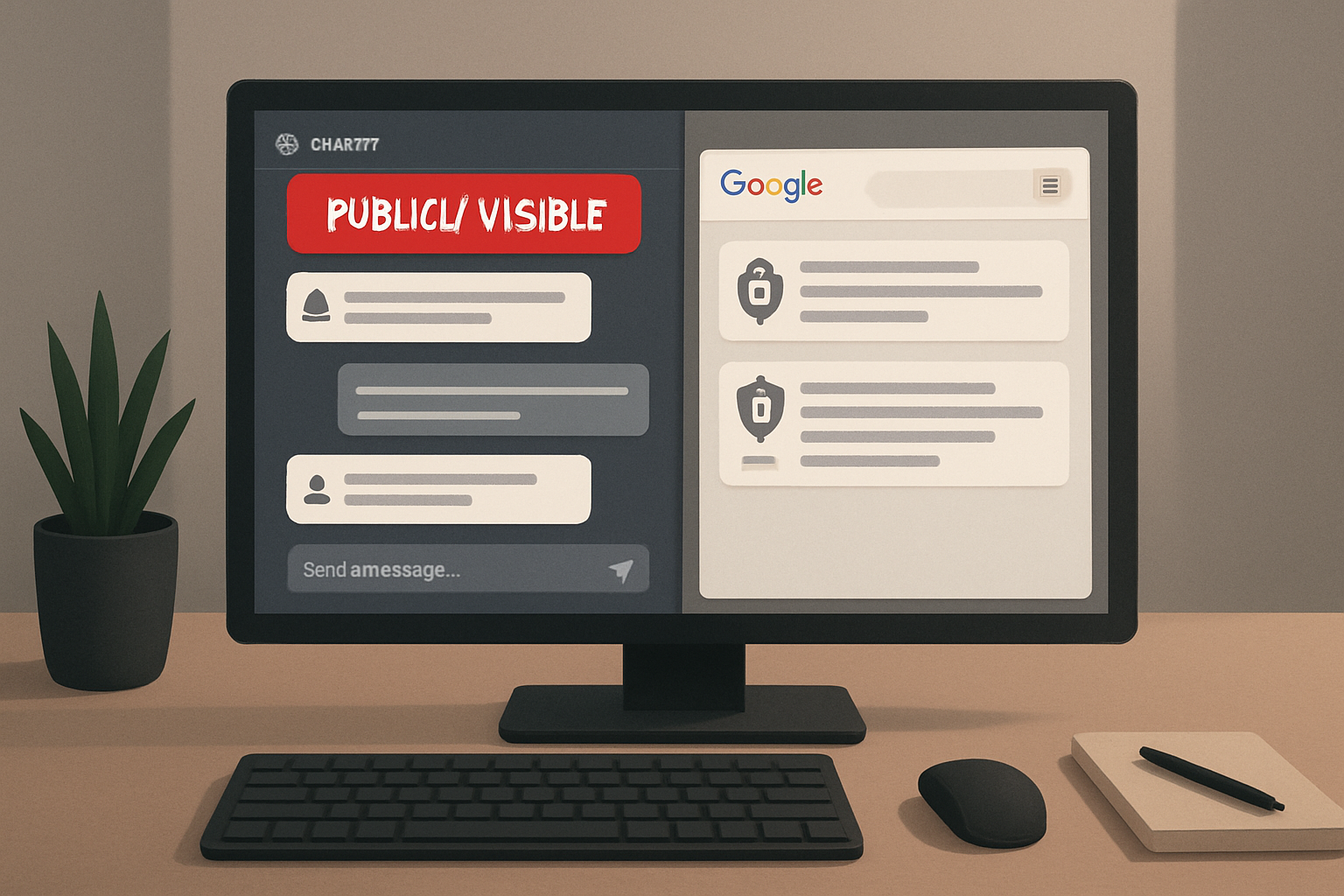In the digital age, a simple conversation with an AI chatbot feels private—but what if those words were suddenly splashed across the web? That’s what happened when over 4,500 ChatGPT conversations, some containing highly sensitive personal, professional, and emotional details, became visible in Google results. This wasn’t a hack, but a consequence of design: OpenAI’s “Share” feature enabled public sharing of chats, compounded by a “Make this chat discoverable” option that left many users unaware of just how visible their information had become.
Let’s unpack how this “privacy breach by design” unfolded, why it sparked such alarm, and what lessons users—and AI developers—must take away in a world increasingly powered by generative AI.
What Happened? From Private Conversations to Google Search Results
The “Share” and “Discoverability” Features
- ChatGPT offered a feature allowing users to generate a shareable URL of any chat—a handy way to show off prompts, responses, or collaborate online.
- Critical: Users could tick a “Make this chat discoverable” checkbox, opting (intentionally or otherwise) for their conversation to be crawled by search engines like Google. techcrunch pcgamer
- The intent was knowledge sharing and collaboration, but in practice, user understanding of the risks was limited, and the interface design did not strongly warn users about public exposure. businessinsider
What Was the Scope of the Exposure?
- Over 4,500 chats indexed in Google—many with intimate confessions, trauma, relationship issues, proprietary business plans, and even PII like emails and resumes. pcgamer
- Once crawled, even deleted public links could remain indexed in Google for days or weeks due to caching and search engine latency. bitdefender
OpenAI’s Response
- As soon as the scale of exposure was clear—and backlash mounted online—OpenAI moved to:
- Remove the discoverability checkbox and the entire feature, rolling out the change for all users globally. grcreport
- Coordinate with search engines to de-index or remove existing public chats.
- Emphasize to users not to share sensitive information via public or semi-public AI chats.
How Did This Happen? A Lesson in User Experience and Consent
1. UI and Consent Failures
- The discoverability toggle was a “short-lived experiment,” but it was easy for users to overlook the privacy implications amidst jargon or unclear warnings.
- Many people habitually tick checkboxes to gain features, rarely reading the fine print—a reality all tech designers must acknowledge. malwarebytes
- The interface did not require multi-step confirmations or display clear, bright warnings about the risk of public search engine indexing.
2. Privacy by Default Must Be the Rule
- Users assumed chats were private by default—a trust that was undermined when conversations appeared in public search results.
- Best practice for modern platforms: make anything less than private both opt-in and friction-heavy, with proactive, well-explained user consent.
The Risks: What’s at Stake for Users?
- Personal harm: Confessions about mental health, relationship issues, or trauma could be linked (even if not named) to a person and cause serious distress.
- Professional and business risk: Leaked IP, strategies, or product ideas shared in “private” chats could be scraped and misused.
- Reputational damage and harassment: Resume info, names, company details, or identifiable anecdotes can expose users to scams, doxxing, or public embarrassment.
- Long-term persistence: Even after removal from ChatGPT and search engines, scraped or cached versions may linger on the wider web.
What Has OpenAI Changed and What Should Users Do Now?
OpenAI’s Key Actions
- Discoverability and public indexing are disabled for all users.
- Existing indexed conversations are being actively removed from Google and other engines, though some may persist in cache for a while.
User Steps for Privacy
- Review and delete old shared links: Visit your ChatGPT account, check under “Shared Links,” and delete any unwanted public conversations.
- Request de-indexing: Use tools like Google’s Remove Outdated Content to speed up removal from search results after links are deleted.
- Never share sensitive data in public AI chats: Treat all shared links as potentially visible on the open web—unless a platform provides ironclad private settings and guarantees.
- Demand transparency: Favor AI systems that foreground privacy controls, granular sharing options, and warnings at every step.
Broader Lessons: Rethinking AI, Privacy, and User Control
Platforms and Developers
- No privacy by chance: Any sharing feature that could expose info to the open web needs multiple confirmations and bold warnings.
- Design for “consent failure”: Assume most users do not read the fine print; design accordingly for maximum protection (not minimum friction).
- Default = Private: Users must specifically, knowingly opt-in to public sharing, with “noindex” on all share links by default.
Regulators and Watchdogs
- Stronger policy needed: This incident is a cautionary tale—platforms must clearly inform users of sharing risks and take responsibility for rapid remediation in any privacy mishap.
- Audit trail: Platforms should provide users with audit logs of any shared data and allow easy, permanent removals.
FAQs
Can I control who sees my AI conversations?
Yes, but only through settings and sharing controls provided by the platform. Never assume any online tool is private unless explicitly stated and documented.
Why didn’t ChatGPT warn me more clearly about sharing?
UI design and rushed features may fail to communicate the actual risk, especially if a discoverable search engine option is buried in small text or confusing menus.
What if my chat is still visible in search?
Delete the share link, then use search engines’ removal tools to expedite de-indexing. Be patient—caches can take time to clear, but most indexed data will be removed.
Privacy by Design Is Non-Negotiable
The ChatGPT conversation indexing episode is a wake-up call: AI and data platforms must treat privacy as a first principle, not an afterthought. Transparency, friction, and strong defaults matter more than ever. For every user, it’s a reminder that what starts as a chat can become forever searchable—unless the right safeguards are in place.









+ There are no comments
Add yours